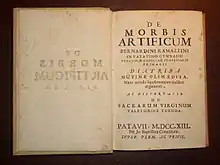De Morbis Artificum Diatriba
The De Morbis Artificum Diatriba (Dissertation on Workers' Diseases) is the first book written specifically about occupational diseases and work-related risk prevention.[1] It was written in Latin by Bernardino Ramazzini and published in Modena in 1700. In 1713 the second edition was printed in Padua. Since a long time, Ramazzini is the acknowledged father of occupational medicine (Pagel JL. Über Bernardino Ramazzini und seine Bedeutung in der Geschichte der Gewerbehygiene. Dtsch Med Wschr 1891;17:224-6; Garrison FH. Founder and father of industrial medicine. Bull NY Acad Med 1934;12:679-94). The Diatriba has been cited by Adam Smith, Karl Marx, and Cotton Mather, and is considered a seminal work in the field of occupational medicine and occupational health.[2] It describes between 53 and 69 different professions, and includes analytical and methodological approaches to diagnose and prevent diseases associated with them.[1][3] It was the first book to consider substance exposure as a cause of headaches.[4]
 Frontpage of the definitive 1713 edition of De Morbis Artificum Diatriba | |
| Author | Bernardino Ramazzini |
|---|---|
| Country | Republic of Venice |
| Language | Latin |
| Subject | Occupational Medicine |
Publication date | 1713 |
| Media type | |
References
- Zanchin, G; Rossi, P; Maggioni, F; Isler, H (1996). "Headache as an Occupational Illness in the Treatise "De Morbis Artificum Diatriba" of Bernardino Ramazzini". Cephalalgia. 16 (2): 79–86. doi:10.1046/j.1468-2982.1996.1602079.x. PMID 8665586.
- Felton, J.S. (1997). "The heritage of Bernardino Ramazzini". Occupational Medicine. 47 (3): 167–179. doi:10.1093/occmed/47.3.167. PMID 9156474.
- Araujo-Alvarez, J.M.; Trujillo-Ferrara, J.G. (2002). "De Morbis Artificum Diatriba 1700-2000" (PDF). Salud Publica de Mexico. 44 (4): 362–370. doi:10.1590/S0036-36342002000400010. ISSN 0036-3634. PMID 12216524.
- Maggioni, F.; Rossi, P; Zanchin, P. (1995). "Headache Associated with Exogeneous Substances - An Idea First Considered in the 18th Century". Confinia Celphalalgica. 4 (2): 67–71. Retrieved 16 January 2019.